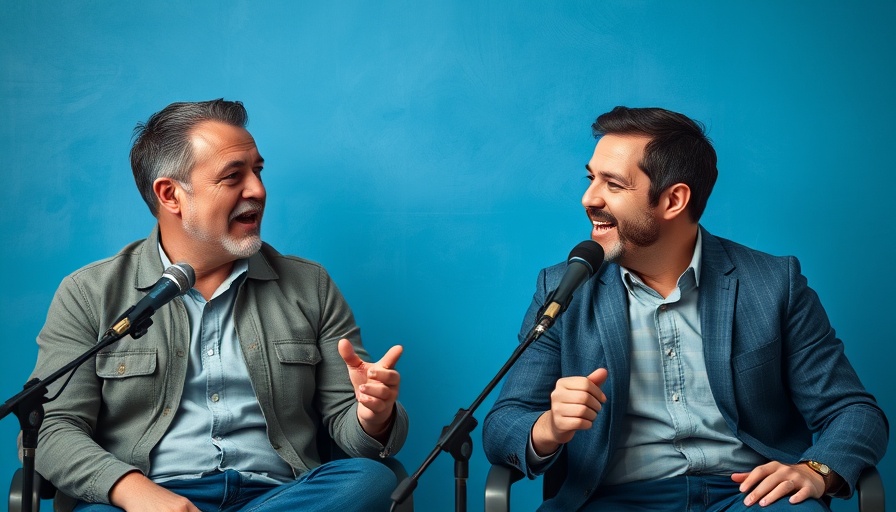
The Impact of Information Overload on Health Anxiety
In today's fast-paced digital world, the overwhelming access to health information has spurred a sharp rise in health anxiety. Individuals are bombarded with advice and diagnoses from websites, social media influencers, and online communities, leading many to self-diagnose based on their symptoms. The COVID-19 pandemic exacerbated this trend, as reported anxiety levels surged, sliding neatly into a troubling normalization of worrying about one’s health.
In 'Understanding anxiety: defining, assessing, and treating health anxiety, OCD, and more,' the discussion dives into critical insights regarding the role of digital media in heightening health anxiety, inspiring us to explore effective response strategies.
Health Anxiety: A New Pandemic?
As a licensed psychologist specializing in anxiety disorders, it's sobering to note that the prevalence of health anxiety has increased post-2020. According to studies, about 4% to 8% of the population now grapples with some form of health anxiety, while the impacts of chronic illness can contribute to elevated rates of anxiety in patients. But what exactly is health anxiety? Simply put, health anxiety manifests when individuals obsessively worry about having a severe illness, even in the presence of medical reassurance. This obsession often leads to compulsive behaviors, including frequent doctor visits, compulsively checking for symptoms, or seeking unnecessary tests.
Understanding the Spectrum of Anxiety Disorders
Health anxiety is just one subset in the broader anxiety disorder catalogue, which also includes OCD, generalized anxiety disorder, and panic attacks. It’s not unusual for individuals to experience multiple disorders simultaneously. Each individual’s manifestation of anxiety may vary greatly; health anxiety can often intertwine with obsessions about other anxiety facets like nagging fears of losing a loved one or fears of social judgment.
Strategies for Addressing Health Anxiety
The good news? Effective interventions exist. Cognitive Behavioral Therapy (CBT) is the gold standard for treating health anxiety. CBT focuses on altering negative thought patterns and behaviors associated with anxiety. For instance, when addressing a patient’s unfounded worry about a heart condition—sparked perhaps by a quick chest tickle—therapy might focus on disentangling real health concerns from exaggerated fears that don’t match reality.
As result-driven therapists often emphasize, action is paramount. The best way to cope involves tackling the anxiety head-on rather than letting it fester.
Integrating Mindfulness and Self-Care
In addition to CBT, mindfulness practices help people who deal with anxiety by encouraging them to stay in the present moment. Techniques such as breath awareness, meditation, or even guided imagery can provide much-needed relief from spiraling thoughts about the future. Additionally, physical activities like walking or any engaging sports can significantly reduce anxiety levels by promoting both mental and physical wellness.
Exploring New Research: The Future of Health Anxiety Treatment
Ongoing research continues to affirm the importance of various strategies in combating health anxiety. Recent interest in telomere science and cellular health is promising: studies suggest that improved cellular health may activate the body's natural ability to resist stressors, which could lead to enhanced mental resilience among anxiety sufferers.
Furthermore, cutting-edge advances in supplements and biohacking approaches that target cellular renewal and longevity are captivating potential avenues for relieving long-term anxiety symptoms. Experts encourage incorporating these practices into a holistic wellness strategy.
Final Thoughts: Empowering Yourself Against Anxiety
Ultimately, the goal must be to reclaim your life from anxiety’s grips. The more personalized health strategies you adopt—be it through therapy, mindfulness practices, or nutritional and fitness plans—the better equipped you will be to handle what life throws your way. Remember, reducing health anxiety doesn’t mean ignoring real health concerns; it’s about finding that delicate balance where action, knowledge, and self-compassion align.
If you're seeking a deeper understanding or personalized health strategies, reach out to a trusted healthcare provider. Staying informed and active will not only empower you but also illuminate your path through the fog of anxiety.
 Add Row
Add Row  Add
Add 




Write A Comment